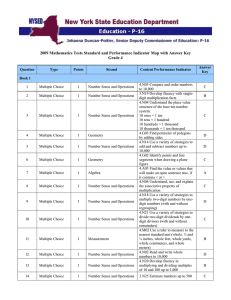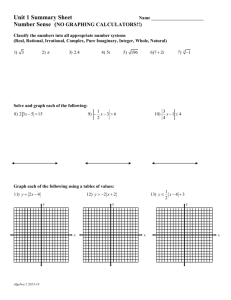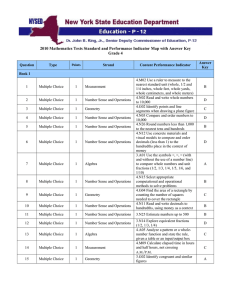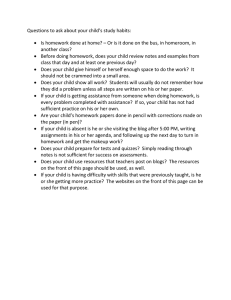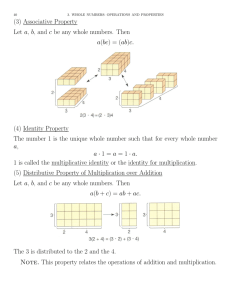2008 Mathematics Tests Standard and Performance Indicator Map with Answer... Grade 4
advertisement
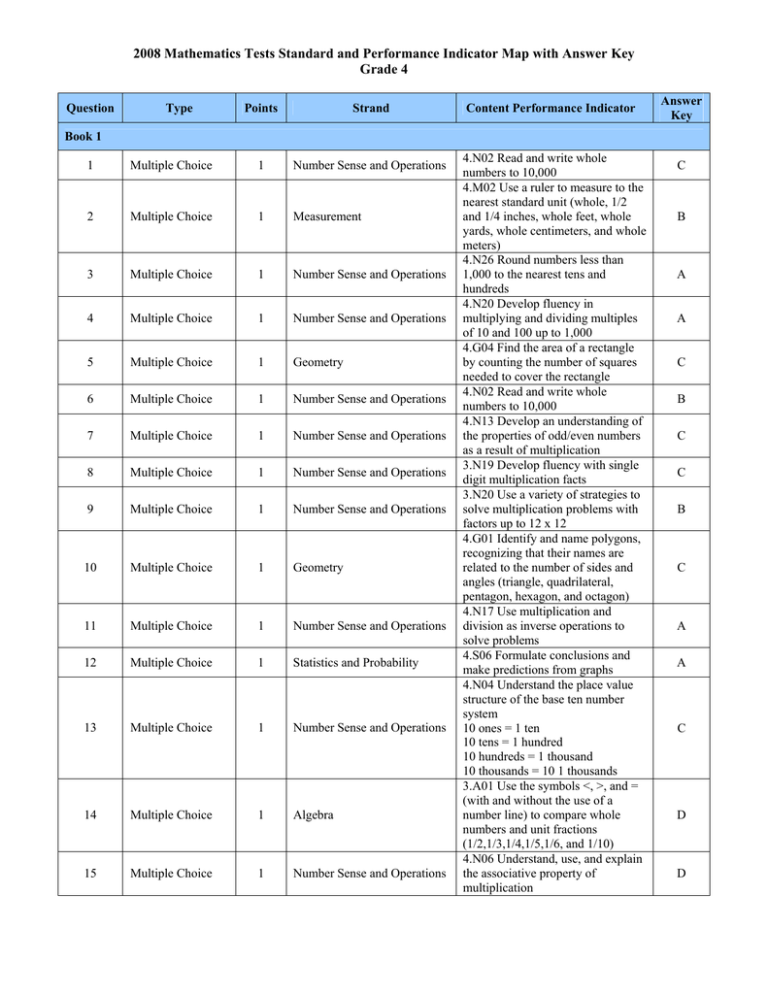
2008 Mathematics Tests Standard and Performance Indicator Map with Answer Key Grade 4 Question Type Points Strand Content Performance Indicator Answer Key Book 1 1 Multiple Choice 1 Number Sense and Operations 2 Multiple Choice 1 Measurement 3 Multiple Choice 1 Number Sense and Operations 4 Multiple Choice 1 Number Sense and Operations 5 Multiple Choice 1 Geometry 6 Multiple Choice 1 Number Sense and Operations 7 Multiple Choice 1 Number Sense and Operations 8 Multiple Choice 1 Number Sense and Operations 9 Multiple Choice 1 Number Sense and Operations 10 Multiple Choice 1 Geometry 11 Multiple Choice 1 Number Sense and Operations 12 Multiple Choice 1 Statistics and Probability 13 Multiple Choice 1 Number Sense and Operations 14 Multiple Choice 1 Algebra 15 Multiple Choice 1 Number Sense and Operations 4.N02 Read and write whole numbers to 10,000 4.M02 Use a ruler to measure to the nearest standard unit (whole, 1/2 and 1/4 inches, whole feet, whole yards, whole centimeters, and whole meters) 4.N26 Round numbers less than 1,000 to the nearest tens and hundreds 4.N20 Develop fluency in multiplying and dividing multiples of 10 and 100 up to 1,000 4.G04 Find the area of a rectangle by counting the number of squares needed to cover the rectangle 4.N02 Read and write whole numbers to 10,000 4.N13 Develop an understanding of the properties of odd/even numbers as a result of multiplication 3.N19 Develop fluency with single digit multiplication facts 3.N20 Use a variety of strategies to solve multiplication problems with factors up to 12 x 12 4.G01 Identify and name polygons, recognizing that their names are related to the number of sides and angles (triangle, quadrilateral, pentagon, hexagon, and octagon) 4.N17 Use multiplication and division as inverse operations to solve problems 4.S06 Formulate conclusions and make predictions from graphs 4.N04 Understand the place value structure of the base ten number system 10 ones = 1 ten 10 tens = 1 hundred 10 hundreds = 1 thousand 10 thousands = 10 1 thousands 3.A01 Use the symbols <, >, and = (with and without the use of a number line) to compare whole numbers and unit fractions (1/2,1/3,1/4,1/5,1/6, and 1/10) 4.N06 Understand, use, and explain the associative property of multiplication C B A A C B C C B C A A C D D 2008 Mathematics Tests Standard and Performance Indicator Map with Answer Key Grade 4 (continued) Question Type Points Strand Content Performance Indicator Answer Key Book 1 (continued) 16 Multiple Choice 1 Measurement 17 Multiple Choice 1 Algebra 18 Multiple Choice 1 Number Sense and Operations 19 Multiple Choice 1 Number Sense and Operations 20 Multiple Choice 1 Measurement 21 Multiple Choice 1 Algebra 22 Multiple Choice 1 Geometry 23 Multiple Choice 1 Number Sense and Operations 24 Multiple Choice 1 Measurement 25 Multiple Choice 1 Number Sense and Operations 26 Multiple Choice 1 Statistics and Probability 27 Multiple Choice 1 Number Sense and Operations 28 Multiple Choice 1 Number Sense and Operations 29 Multiple Choice 1 Algebra 30 Multiple Choice 1 Geometry 31 Short Response 2 Number Sense and Operations 4.M04 Select tools and units appropriate to the mass of the object being measured (grams and kilograms) 4.A05 Analyze a pattern or a wholenumber function and state the rule, given a table or an input/output box 4.N27 Check reasonableness of an answer by using estimation 3.N15 Compare and order unit fractions (1/2, 1/3, 1/4) and find their approximate locations on a number line 4.M01 Select tools and units (customary and metric) appropriate for the length being measured 4.A02 Use the symbols <, >, =, and ≠ (with and without the use of a number line) to compare whole numbers and unit fractions and decimals (up to hundredths) 3.G02 Identify congruent and similar figures 3.N14 Explore equivalent fractions (1/2, 1/3, 1/4) 4.M09 Calculate elapsed time in hours and half hours, not crossing A.M./P.M. 4.N22 Interpret the meaning of remainders 4.S05 Develop and make predictions that are based on data 4.N15 Select appropriate computational and operational methods to solve problems 3.N14 Explore equivalent fractions (1/2, 1/3, 1/4) 4.A01 Evaluate and express relationships using open sentences with one operation 4.G02 Identify points and line segments when drawing a plane figure 4.N14 Use a variety of strategies to add and subtract numbers up to 10,000 A A C D B B B C B B C A B A D n/a 2008 Mathematics Tests Standard and Performance Indicator Map with Answer Key Grade 4 (continued) Question Type Points Strand Content Performance Indicator Answer Key Book 2 32 Short Response 2 Number Sense and Operations 33 Short Response 2 Measurement 34 Short Response 2 Measurement 35 Extended Response 3 Geometry 36 Short Response 2 Number Sense and Operations 37 Short Response 2 Number Sense and Operations 38 Short Response 2 Algebra 39 Extended Response 3 Statistics and Probability 4.N18 Use a variety of strategies to multiply two-digit numbers by onedigit numbers (with and without regrouping) 4.M08 Make change, using combined coins and dollar amounts 4.M03 Know and understand equivalent standard units of length:12 inches = 1 foot, 3 feet = 1 yard Part A: 4.G03 Find perimeter of polygons by adding sides Part B: 4.G04 Find the area of a rectangle by counting the number of squares needed to cover the rectangle 4.N22 Interpret the meaning of remainders 4.N17 Use multiplication and division as inverse operations to solve problems 4.A04 Describe, extend, and make generalizations about numeric (+,-,×,÷) and geometric patterns 4.S03 Represent data using tables, bar graphs, and pictographs n/a n/a n/a n/a n/a n/a n/a n/a Book 3 40 Short Response 2 Number Sense and Operations 41 Short Response 2 Geometry 42 Short Response 2 Measurement 43 Extended Response 3 Algebra 44 Extended Response 3 Number Sense and Operations 45 Short Response 2 Algebra 46 Short Response 2 Number Sense and Operations 47 Short Response 2 Statistics and Probability 48 Short Response 2 Number Sense and Operations 4.N18 Use a variety of strategies to multiply two-digit numbers by onedigit numbers (with and without regrouping) 4.G03 Find perimeter of polygons by adding sides 4.M08 Make change, using combined coins and dollar amounts 4.A05 Analyze a pattern or a wholenumber function and state the rule, given a table or an input/output box 3.N20 Use a variety of strategies to solve multiplication problems with factors up to 12 x 12 4.A04 Describe, extend, and make generalizations about numeric (+,-,×,÷) and geometric patterns 4.N21 Use a variety of strategies to divide two-digit dividends by onedigit divisors (with and without remainders) 4.S03 Represent data using tables, bar graphs, and pictographs 4.N06 Understand, use, and explain the associative property of multiplication n/a n/a n/a n/a n/a n/a n/a n/a n/a
